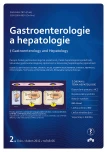Current approach to anaemia in patients with inflammatory bowel disease
Authors:
M. Bátovský
Authors‘ workplace:
Gastroenterologická klinika SZU a UN Bratislava
Published in:
Gastroent Hepatol 2012; 66(2): 131-135
Category:
IBD: Review Article
Overview
Inflammatory bowel diseases (IBD) – Crohn’s disease and ulcerative colitis – are commonly associated with a number of extraintestinal complications, including anaemia. Anaemia is considered to be a key symptom and is a common clinical feature of IBD in one-third of patients. Although anaemia in IBD is multifactorial, iron deficiency and anaemia of chronic disease are the most important causes of anaemia in this population. Iron deficiency develops due to several factors, including blood loss from intestinal bleeding, food aversions affecting the amount of dietary iron available and malabsorption of iron in Crohn’s disease patients. Anaemia of chronic disease is also caused by inflammation that further blocks iron absorption capacity. Anaemia has an important negative impact on the quality of life. Chronic blood loss results in the depletion of iron stores before anaemia manifests itself, and it is therefore of utmost importance that physicians screen their IBD patients for iron deficiency (at least annually even in patients in clinical remission) and manage it appropriately. Oral iron is traditionally the first-line treatment for reasons of convenience and cost, although it has suboptimal tolerability, particularly in IBD patients, who develop diarrhoea and increased abdominal pain and worsening of the course of IBD. Intravenous iron is highly efficacious, better tolerated and can be safely combined with other i.v. treatments such as biologicals. Erythropoietin is effective for the treatment of the anaemia of chronic disease and should be considered in IBD patients if Hb is less than 10g/dL or if there is no response to i.v. iron therapy within 4 weeks. Only as a very last resort should blood transfusions be considered to replenish iron.
Key words:
anaemia – serum iron – chronic inflammation – serum transferrin – serum ferritin – inflammatory bowel disease
Sources
1. Dieška D. Málokrvnosť. Martin: Osveta 1971 : 304.
2. Gasche C, Berstad A, Befrits R et al. Guidelines on the diagnosis and management of iron deficiency and anemia in inflammatory bowel diseases. Inflamm Bowel Dis 2007; 13(12): 1545–1553.
3. Oustamanolakis P, Koutroubakis IE, Kouromalis EA. Diagnosing anemia in inflammatory bowel disease: beyond the established markers. J Crohn´s Colitis 2011; 5(5): 381–391.
4. Loitsch SM, Diehl D, Hartman F et al. Impaired intestinal iron absorption in patients with inflammatory bowel disease correlates with disease activity. J Crohn´s Colitis 2011; 5: S82.
5. Oustamanolakis P, Koutroubakis IE, Messaritakis I et al. Measurement of reticulocyte and and red blood cell indices in the evaluation of anemia in inflammmatory bowel disease. J Crohn´s Colitis 2011; 5(4): 295–300.
6. Briggs C. Quality counts:new parameters in blood cell counting. Int J Lab Hematol 2009; 31(3): 277–297.
7. Hörl WH, Cavill I, MacDougall IC et al. How to diagnose and correct iron defficiency during r-huEPO therapy – a consensus report. Nephrol Dial Transplant 1996; 11(2): 246–250.
8. Scrimgeour AG, Condlin ML. Zinc and micronutrient combinations to combat gastrointestinal inflammation. Curr Opin Clin Nutr Metab Care 2009; 12(6): 653–660.
9. Urrechaga E, Borque L, Escanero JF. Analysis of reticulocyte parameters on the Sysmex XE 5000 and LH 750 analysers in the diagnosis of the inefficient erythropoiesis. Int J Lab Hematol 2011; 33(1): 37–44.
10. Stein J, Bager P, Befrits R et al. Current practice of anemia management in patients with inflammatory bowel disease across nine European countries. UEGW Stockholm 2011, Poster session IBD, Poster ID.PO933.
11. Kuenigg S, Gasche C. Systematic review: managing anaemia in Crohn´s disease. Aliment Pharmacol Ther 2006; 24(11–12): 1507–1523.
12. Evstatiev R, Martenau P, Igbal T et al. FERGIcor, a randomized controlled trial on ferric carboxymaltose for iron deficiency anemia in inflammatory bowel disease. Gastroenterology 2011; 141(3): 846–853.
Labels
Paediatric gastroenterology Gastroenterology and hepatology SurgeryArticle was published in
Gastroenterology and Hepatology

2012 Issue 2
- Possibilities of Using Metamizole in the Treatment of Acute Primary Headaches
- Metamizole at a Glance and in Practice – Effective Non-Opioid Analgesic for All Ages
- Metamizole vs. Tramadol in Postoperative Analgesia
- Spasmolytic Effect of Metamizole
- The Importance of Limosilactobacillus reuteri in Administration to Diabetics with Gingivitis
-
All articles in this issue
- Good news
- XVIst Hradec days of gastroenterology and hepatology
- Prof. Jiří Nevoral on the occasion of his 70th birthday
- 20 years as a member of the committee of the Czech Society of Gastroenterology
- Esomeprazole – the first proton-pump inhibitors of the „second“ generation
- Recommended procedures for the treatment and diagnostics of hepatocellular carcinoma
- Histopathological diagnosis of hepatocellular carcinoma
- Rotor syndrome is conditioned by impaired liver uptake of conjugated bilirubin
- Hepatorenal syndrome in patients with acute alcoholic hepatitis
- Graft-versus-host disease as an unusual complication following liver transplant
- Treatment of achalasia – the current approach and personal experience
- Analysis of volatile compounds in the breath of patients with inflammatory bowel diseases
- Current approach to anaemia in patients with inflammatory bowel disease
- International agreement statements for monitoring disease activity in Crohn’s disease patients: The results of the IBD AHEAD 2011 project
- Gastroenterology and Hepatology
- Journal archive
- Current issue
- About the journal
Most read in this issue
- Hepatorenal syndrome in patients with acute alcoholic hepatitis
- Current approach to anaemia in patients with inflammatory bowel disease
- Treatment of achalasia – the current approach and personal experience
- Prof. Jiří Nevoral on the occasion of his 70th birthday
